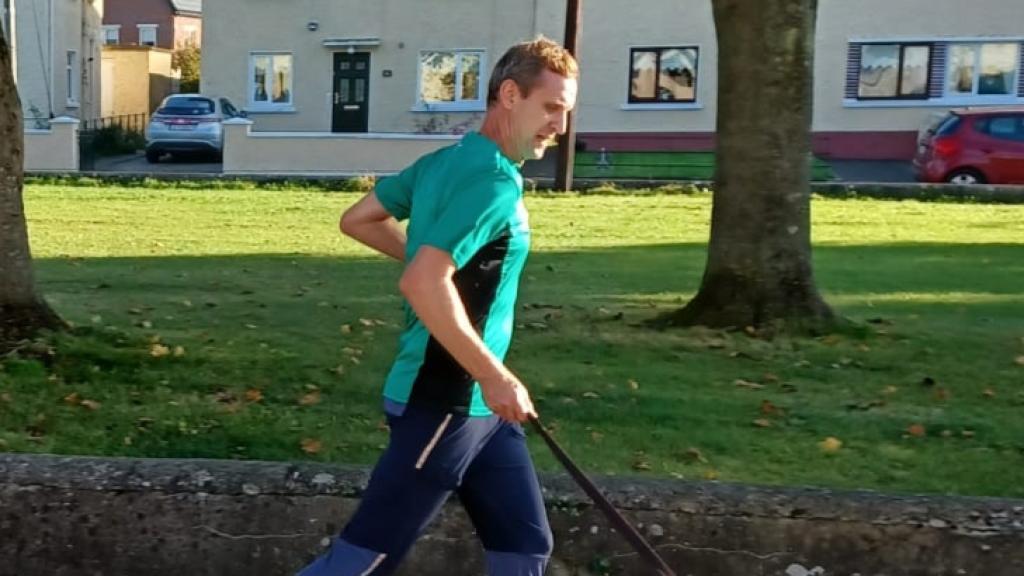
Jamie Power – 'It was tough trying to shield my four children from the madness of treatment and stay on an even keel.'
Dad of 4, Jamie Power from Lucan in Co. Dublin, woke up on St. Patrick’s Day 2019 with a large lump on the side of his neck. He assumed he had displaced a muscle, so visited his GP the next day.
Looking back, he recalls that he had some other tell-tale signs which he had ignored for a number of months including: fatigue and a general feeling of malaise, symptoms he put down to his stressful work and busy lifestyle.
His GP referred him to hospital to see a throat specialist. After initially thinking Jamie had an infection, they performed some scans and ordered biopsies. Jamie tells of the devastation he felt to hear the news that he had throat cancer.
Jamie speaks of the emotional impact of receiving a cancer diagnosis.
“The first few weeks are the hardest emotionally. You believe that every diagnosis is catastrophic and I when I asked about my prognosis the doctor said 80% of people survive, but instead, I looked at it as 1 in 5 die as opposed to 4 in 5 survive. It’s only really been in the last year that I’ve really learned not to catastrophize. It takes years to move solidly on from a cancer diagnosis.”
Jamie’s treatment included a tonsillectomy, 35 sessions of radiotherapy across 7 weeks and three sessions of chemotherapy.
Jamie had a further setback in Christmas, when he suffered from radiation recall, causing difficulty breathing, pain and delirium. He had hoped to return to work at the end of January, but postponed until May 2020.
During his treatment, Jamie visited the Daffodil Centre at the Hermitage and the Irish Cancer Society’s website for trusted information and advice.
“On the day of my diagnosis I spoke with a great nurse there who gave me some leaflets and guidance. They spoke to me calmly, it was certainly needed at the time, as I was alone in hospital- my wife was at home our new the baby, she couldn’t just come to me.
I also used the Irish Cancer Society website, which is a great resource, it’s useful because unlike Google, it’s not catastrophic which really isn’t helpful when you are struggling to come to terms with a diagnosis.”
Throughout his treatment Jamie also availed of counselling, which he recommends to anyone affected by cancer.
“Initially I shut down when I was offered counselling, I thought I didn’t need it, and thought it would get in the way of what I was going through, but in reality it was great and was such an important space to go and vent about those fears.”
I would absolutely recommend counselling, particularly for someone who was resistant, but I couldn’t recommend it more. It was an integral part of the treatment process for me, you have so much going on and having that space is so important and I knew that after a few weeks” he says.
Thankfully Jamie is doing well now and notes how his cancer diagnosis has changed him ‘for the better’.
“Once you get through something like that you will be more resilient. I no longer sweat the small stuff, I’m not perfect and still have disagreements but I definitely tend to move past things quickly.”
Looking back on his illness he recalls the incredible care from his medical team, but also the vast support shown to him from friends, family and colleagues.
“The support shown by other people during the treatment made it bearable. People came out of the woodwork to help. It was extraordinary really.”
Jamie attributes his recovery to looking after both his mental and physical health.
“Getting over the whole thing psychologically was dependant on starting to slowly move. I started walking with Twix the dog, then running a few hundred yards and kept challenging myself. I have run a few marathons now including for the Irish Cancer Society and have run a good few sub 20 minute 5kms which are the first since I was a young lad. I still go to the rugby club though my playing days are probably behind me. Being old did that, not cancer!"
Getting moving and staying moving was desperately hard but has paid Warren Buffett sized dividends. So people and a German Pointer dog will sort you right out.
Find further advice and information on prostate cancer at https://www.cancer.ie/cancer-information-and-support/cancer-types/mouth…, or contact our Freephone Support Line on 1800 200 700 or SupportLine@IrishCancer.ie
For more information
Phone
1800 200 700


